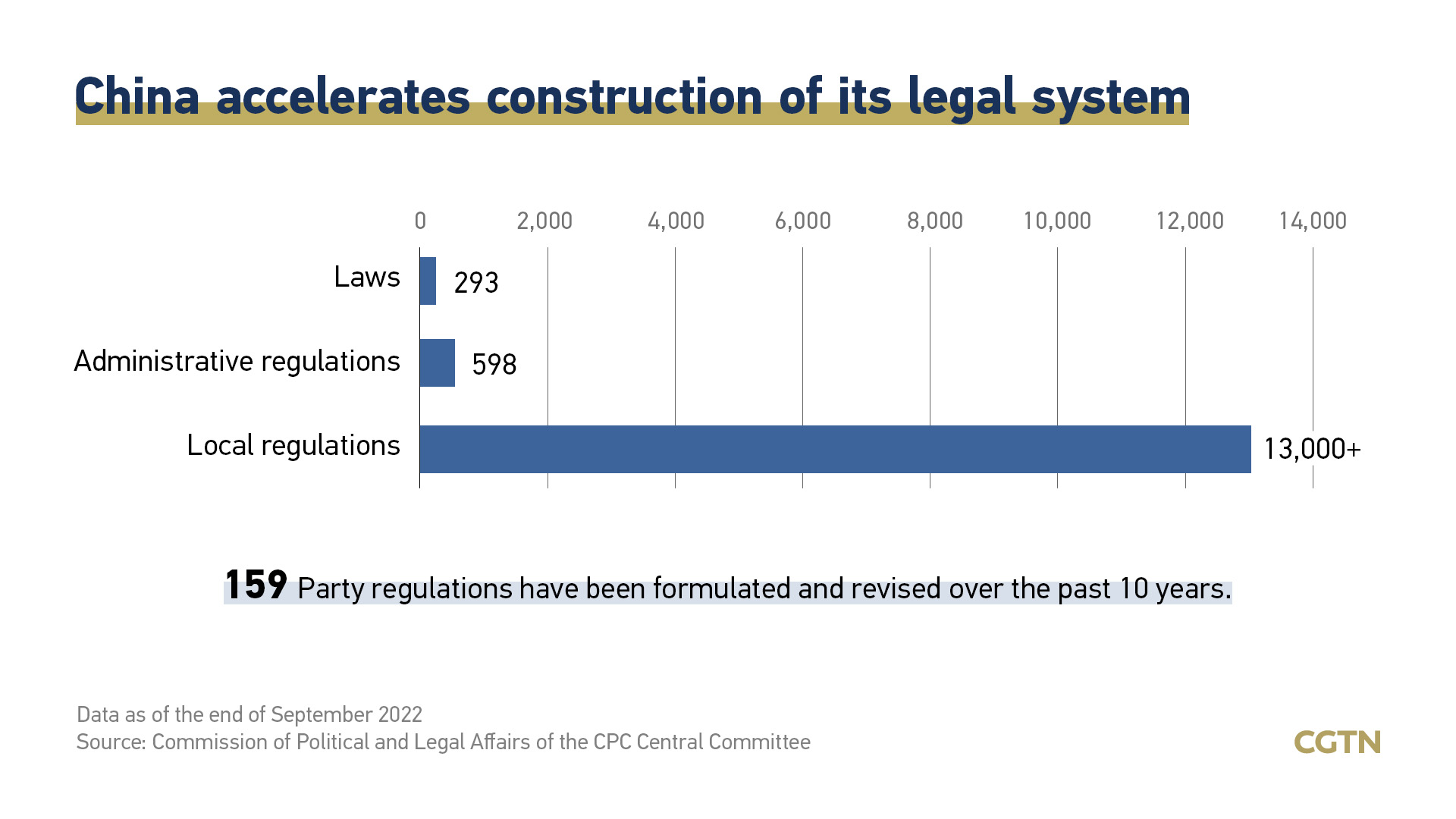Editor's note: The week-long 20th National Congress of the Communist Party of China concluded on October 22, with a blueprint mapped out for China's future development in the next five years and beyond. CGTN is publishing "How China Works – Charting the Future," a special series delving deep into a key report adopted at the Congress, to see how the country can fulfill the goals and tasks on the new journey of the new era.
"Thanks to our country's progress on the rule of law, my name was finally cleared," said Zhang Yuhuan, who was jailed for nearly 27 years for intentional homicide and acquitted in August 2020.

Zhang received about 4.96 million yuan($680,000) in compensation from the state. Zhang was among several criminal defendants whose wrongful convictions were overturned by judicial organs after retrials under the law in recent years.
"We must work to ensure that the people feel fairness and justice prevail in every law, every law enforcement decision and every judicial case," said President Xi Jinping.
The report delivered by Xi at the opening session of the 20th National Congress of the Communist Party of China (CPC) on October 16 not only mentioned the term of "rule of law" 23 times, but for the first time also had a full chapter dwelling on the significance of advancing the rule of law and exercising law-based governance on all fronts.
Since reform and opening-up began in 1978, the CPC has unswervingly promoted the building of the rule of law, Wang Yi, vice president of Renmin University of China, stressed in an article discussing how to promote rule of law.
The past four decades of experience have shown that the deeper the reform and opening-up, and the more complex the development environment, the more we should emphasize the rule of law, Wang added.

Rule of law advanced in past decade
In the summer of 2017, the country's first macro-level quality promotion regulations were introduced to provide a reliable institutional guarantee for further innovative development of south China's Shenzhen City, which was born from reform and strengthened due to opening-up.
A batch of laws urgently needed for the country's governance and satisfying the people's growing needs for a better life were introduced or revised in recent years, said Wang Tiemin, deputy secretary-general of the Standing Committee of the National People Congress, at a press conference on the legislative work in the past decade on June 29 .
Besides the famed Civil Code, the country has in the past decade not only witnessed the revision of the Environmental Protection Law and the Food Security Law, but also formulated the Charity Law and the Anti-Domestic Violence Law, which all responded to public concerns.
By the end of September 2022, China had 293 national laws and 598 administrative regulations in effect, with more than 13,000 regional regulations, said Yin Bai, deputy secretary-general of the Commission of Political and Legal Affairs of the CPC Central Committee, at a briefing held by the Press Center for the 20th CPC National Congress in Beijing on October 19.
The judicial system also underwent changes with 85 percent of personnel in judicial authorities working cases directly, raising the number of cases handled per capita by 20 percent and the clearance rate by 18 percent, Yin added.
More than 1.9 million administrative reconsideration cases have been reviewed in the past 10 years, and a nationwide network of public legal services has been built with more than 600,000 villages or communities installed with legal consultants, said Zuo Li, vice minister of Justice, at the same briefing.
Read more:
20th CPC National Congress: China's rule of law underpins justice for the people

Grassroots judges hear a case at a circuit court in Wenchang, a village in southwest China's Chongqing Municipality, September 2021. /Xinhua
Grassroots judges hear a case at a circuit court in Wenchang, a village in southwest China's Chongqing Municipality, September 2021. /Xinhua
Law-based governance vital for people's well-being
The report, adopted at the closing session of the 20th CPC National Congress, highlights that the comprehensive advancement of law-based governance has been a profound revolution in China's governance.
"We must, with a focus on protecting and promoting social fairness and justice, pursue coordinated progress in law-based governance, law-based exercise of state power and law-based government administration and take integrated steps to build a country, government and society based on the rule of law," the report said.
To implement the requirements, the top legislature will step up legislation in key, emerging and foreign-related fields and advance the rule of law in domestic and foreign-related affairs in a coordinated manner to meet the nation's development needs and respond to public concerns, said Zang Tiewei, spokesman for the National People's Congress Standing Committee's Legislative Affairs Commission, at a press conference interpreting the report on October 24.
Echoing the plan to build the rule of law in China (2021-2025) issued last year, which outlined that a system of distinctively Chinese socialist rule of law shall take shape by 2025 and be basically formed by 2035, the report stresses that "We must follow a path of socialist rule of law with Chinese characteristics."
"Law-based governance is important for the Party's success in governing and rejuvenating the country, for the well-being of the people,and for the long-term stability of the Party and the country," said the report.